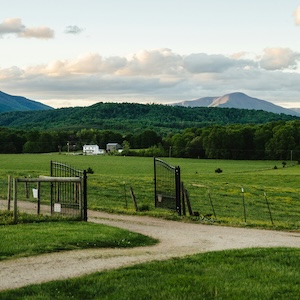
Cultivating Repair on Historic Landscapes: Co-Creating an Environmental Justice Learning Model
Research Location: Virginia, USA
Conservation Partners: Highland and Highland Council of Descendent Advisors
Faculty Mentors
Dr. Sara Bon Harper and Dr. Troy Wipongwii
2025 Student Researchers
Sophia (Sage) Carmen Futrell '26 , Major: Anthropology; Minor: Biology
Eliana Rougle '28, Majors: Envronmental Science and Biology (Undeclared)
Project Description
Historic plantations have been painful places for generations of enslaved and free African Americans and Indigenous people. Racial injustices continue well beyond the end of legal slavery and contribute to multi-generational alienation from rural and agricultural landscapes that otherwise might enhance wellbeing and community belonging.
Framed and led by James Monroe’s Highland’s Council of Descendant Advisors, this project addresses this disconnection by engaging community members and undergraduate students in an exploration of the ecological and cultural components of local food systems.
Drawing on William & 玛丽’s research and teaching strengths, the Institute for Integrative Conservation (IIC), faculty, students, and descendant community members will co-develop a learning model to be applied and tested at Highland, a component of William & 玛丽’s Office of Strategic Cultural Partnerships. This proposed humanities-centered learning model will bridge disciplines, communities, and knowledge forms to demonstrate how histories, cultures, and ecology are interrelated. The learning model outcomes include ameliorating participants’ relationships with historically painful landscapes and providing some repair of generational harm. The result will inspire community members—young and old—to develop new ecological relationships previously displaced by plantation violence.
W&M students will work with the Council to develop and host a youth summer program at Highland centered on introspective relations to land and food justice from the critical lens of plantation legacies and food systems and led by Black farmers and/or growers of color.
Project ID - Format
25-006-25 - CRP Year
















